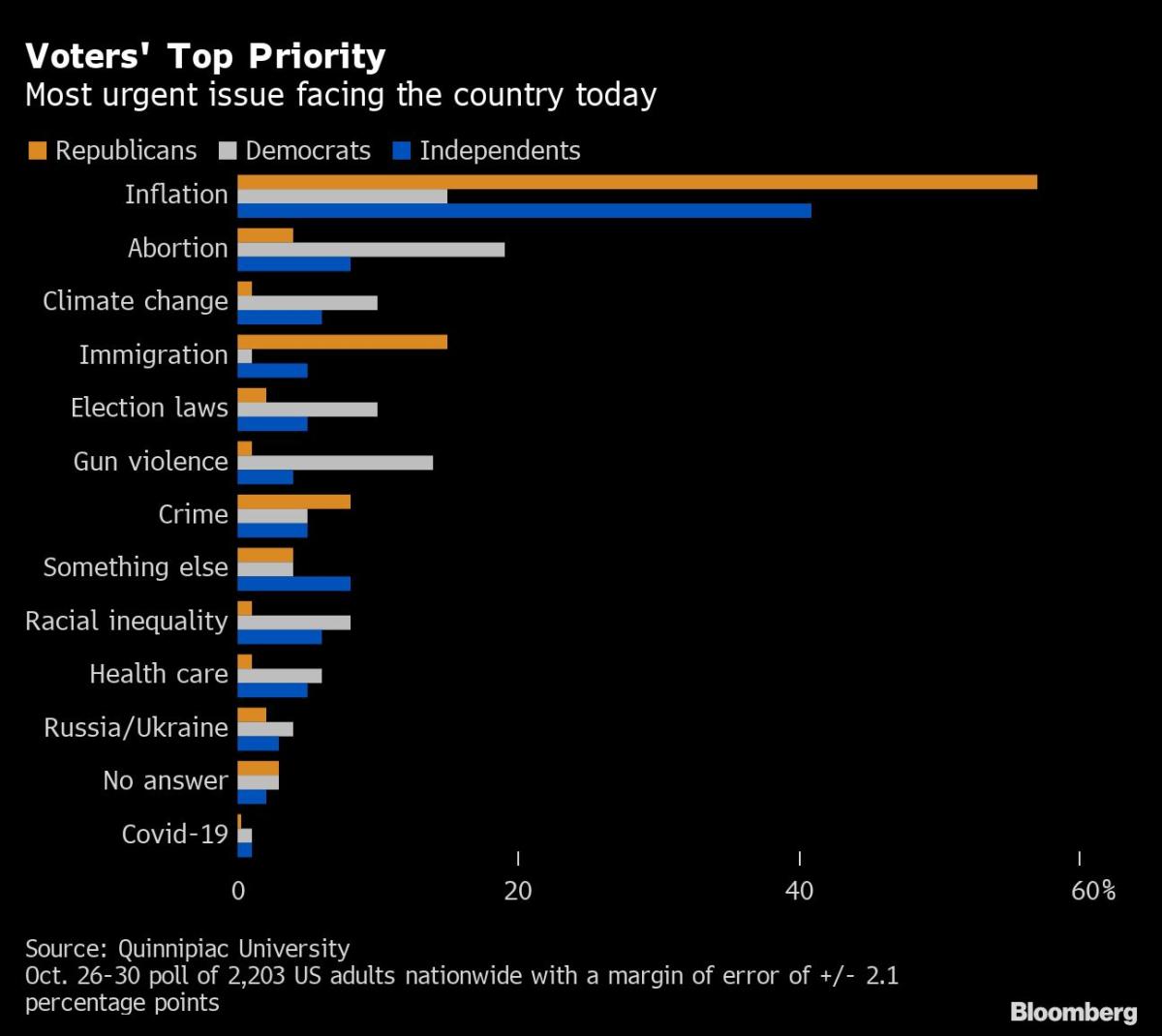
(Bloomberg) — Republicans advanced toward control of the US House but by smaller margins than forecast and Democrats gained a Senate seat in Pennsylvania, as US voters delivered a mixed verdict in an election shaped by concerns about inflation and by the nation’s divisions on cultural and social issues.
Most Read from Bloomberg
With polls closed across most of the US, some of the bellwether races that had been targets for Republicans suggested the party’s gains in the midterms may be limited and even below historical averages.
President Joe Biden’s party is trying to buck history by holding onto their razor thin congressional majorities with the president’s remaining legislative agenda hanging in the balance. Since World War II, the party holding the White House has on average lost 26 House seats and four Senate seats. Barack Obama’s Democrats lost 63 House seats in 2010 and Donald Trump’s Republicans 40 House seats in 2018.
In the biggest victory of the night for Democrats, John Fetterman narrowly defeated Republican television celebrity Mehmet Oz in the Pennsylvania Senate race, which was one of the country’s hardest fought contests. Fetterman’s victory was vital to any Democratic hopes of keeping control of the Senate.
In Georgia, incumbent Democratic Senator Raphael Warnock led GOP candidate Herschel Walker by a few thousand votes in a race that could ultimately be decided in a runoff.
In other closely watched contests, JD Vance defeated Democrat Tim Ryan to keep an Ohio Senate seat in Republican hands while incumbent Arizona Democratic Senator Mark Kelly was leading Republican Blake Masters. Wisconsin Senator Ron Johnson, a Republican, was leading his Democratic challenger, Lieutenant Governor Mandela Barnes with most of the votes counted.
All of the Republican candidates were backed by former President Donald Trump, who has campaigned across the country and is expected to announce his third run for the White House next week
A clear victory for the GOP came in Florida, which continued making the turn from swing state to Republican stronghold. GOP Governor Ron DeSantis, a potential contender for the party’s 2024 presidential nomination, and Senator Marco Rubio handily won re-election. GOP candidates expanded their representation in the House by winning three seats that had been held by Democrats as well as another created in redistricting.
Voters delivered mixed signals in House races.
Virginia had three races featuring Democratic incumbents considered indicators for the election. Democratic incumbents Abigail Spanberger and Jennifer Wexton were projected to win re-election. But Representative Elaine Luria was projected to lose to GOP challenger Jen Kiggans. In Michigan, Representative Elissa Slotkin was trailing Republican Tom Barrett. All four women were elected as part of a Democratic wave in 2018 and were targeted by Republicans. In Ohio, Cincinnati City Councilman Greg Landsman defeated Representative Steve Chabot, the last remaining member of the Republican Revolution that took control of the House in 1994.
All 435 House seats are on the ballot, and Republicans need to net just five to gain the majority. There are 35 seats at stake in the evenly divided Senate, and control will come down to who prevails in roughly seven close races. Thirty-six states also have contests for governor.
There were sporadic reports of voting glitches, including isolated cyber attacks, though none caused major disruptions. Arizona Republicans seized on technical problems with ballot tabulation machines in the state’s largest county to make unsubstantiated claims about the validity of Tuesday’s elections, signaling a contentious aftermath for the 2022 midterms.
GOP majorities in one or both congressional chambers would end unified Democratic control in Washington and lead to intensified partisan battles and policy gridlock. The Biden administration would face an onslaught of investigations from subpoena-wielding Republican committee chairs in the House.
Democrats’ hopes for tax increases on the wealthy and corporations would be dashed should Republicans take at least one chamber. Prospects diminish for antitrust legislation aimed at big tech companies or a windfall profits tax on oil companies. Government shutdowns and a standoff over a US debt default also grow more likely.
And Republican control of the Senate would give the party a veto over Biden’s nominations to fill top jobs at agencies and in the federal judiciary.
Democrats were already beginning to assess their losses.
“We have to plan for 2024 differently than what took place in 2022,” South Carolina Representative James Clyburn, the third-ranking House Democrat, told CBS. “Now does that mean bringing in new people? Does that mean reassigning roles? I don’t know. I just think that people ought to just be honest with their assessments.”
The outcome of the midterms, which for much of the summer and early fall seemed remarkably close, will hinge on Americans’ frustration over the rising cost of living and worries about the slowing economy. Democrats all along faced an uphill battle given widespread public discontent — two-thirds of Americans think the country is on the wrong track — and voters’ historical tendency to punish the president’s party in midterm elections.
Democrats took the lead in national polls and some key Senate races during the summer after a Supreme Court decision ended a national right to abortion access galvanized Democrats and independents, declining gasoline prices eased pressure on consumers and several prominent Republican Senate nominees struggled with controversies over extreme views or personal scandals.
But polls showed voters breaking toward Republicans in the final weeks of the campaign as the GOP hammered away at Democrats’ management of the economy, stoked fears of rising crime and decried a surge of undocumented immigrants at the border. Democrats’ problems were compounded by underwhelming debate performances by John Fetterman and US Senator Raphael Warnock, Senate candidates in Pennsylvania and Georgia, both critical contests.
The declines in gasoline prices stopped by mid-September. Annual inflation rates, while down from a 9.1% peak in June, remained near a four-decade high at 8.2% in September.
At the same time, the Federal Reserve’s campaign of interest-rate hikes, launched to bring inflation under control, began to bite into the economy. After rising for three months, consumer confidence dipped in October. More companies announced hiring freezes and layoffs. The housing market ground to a near-halt as 30-year mortgage rates soared above 7%.
Fears of an imminent recession are also rising, with private forecasters on average seeing a 60% probability within a year.
Democrats struggled to deliver a consistent message on the economy. At times, they promoted consumer cost savings on prescription drugs and health insurance from Biden’s Inflation Reduction Act, pounded away at oil company profiteering with threats of a windfall profits tax and seized on statements from some GOP leaders threatening to cut Social Security and Medicare benefits.
Biden closed the cycle with an address warning of the danger posed to democracy by a slew of Republican congressional candidates who deny the 2020 presidential election outcome and urged Americans to reject Donald Trump’s “big lie” refusing to recognize the defeat. He drew a direct line from last year’s Capitol insurrection by Trump supporters to a hammer-wielding assailant’s attack just before the midterms on House Speaker Nancy Pelosi’s 82-year-old husband.
Meanwhile, Trump all but confirmed at an Ohio rally on Monday that he will be announcing a third White House bid Nov. 15 at his Mar-a-Lago estate.
–With assistance from Gregory Korte and Greg Giroux.
Most Read from Bloomberg Businessweek
©2022 Bloomberg L.P.




